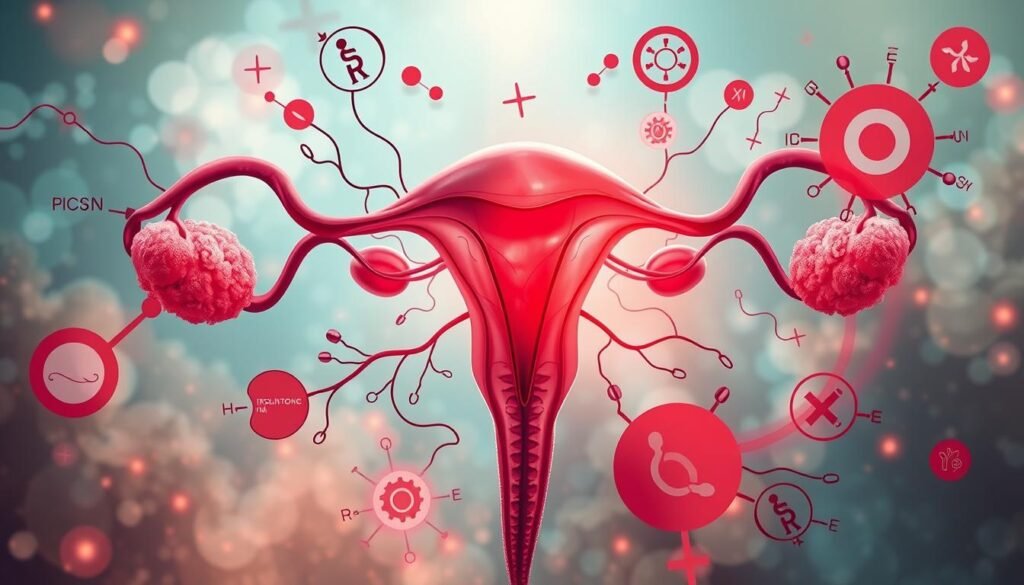About 1 in 10 women of childbearing age in the U.S. are impacted by Polycystic Ovary Syndrome (PCOS). This important fact shows why we need to really get what this complex condition means. It leads to various health concerns, such as hormone imbalance and infertility. Knowing the causes of PCOS, like insulin resistance and lifestyle choices, is key.
PCOS affects more than just fertility; it touches on all aspects of a woman’s health. Women may experience changes in their periods, weight gain, and mood challenges. Understanding PCOS causes is critical for managing and treating it. With knowledge about hormones and external factors, women can work towards a healthier life.
Key Takeaways
- PCOS affects approximately 1 in 10 women of reproductive age.
- Understanding the causes of PCOS is essential for effective management.
- Hormone imbalance plays a significant role in the development of PCOS.
- Insulin resistance is another key factor associated with PCOS.
- Pursuing a healthy lifestyle can help mitigate the symptoms of PCOS.
Introduction to PCOS
Polycystic Ovary Syndrome (PCOS) is a common hormonal disorder affecting many women globally. It leads to reproductive, metabolic, and psychological complications. Understanding this condition is crucial because of its varied symptoms. Symptoms like irregular menstrual cycles, weight gain, and acne impact a woman’s life significantly.
In the realm of women’s health, PCOS is a key risk factor for serious health issues, including diabetes and heart disease. It affects more than just reproductive health. Organizations, including the American Society for Reproductive Medicine, emphasize the importance of awareness. They highlight the need for effective management strategies for PCOS.

What is PCOS?
Polycystic Ovary Syndrome (PCOS) is a widespread condition. It affects women of reproductive age. The definition of PCOS includes a variety of symptoms tied to hormonal imbalances. One key issue is the development of multiple cysts on the ovaries. These cysts lead to problems like irregular menstrual cycles, weight gain, acne, and a lot of hair growth. It’s important to know that these issues can vary greatly from one person to another, which makes diagnosing PCOS tricky.
Doctors use the Rotterdam criteria to identify PCOS. This method requires at least two of these signs: lots of cysts on the ovaries shown by ultrasound, signs of too much androgen, or irregular menstrual cycles. This gives doctors a clear way to find out if someone has PCOS, pointing out the importance of spotting its various signs.
Having PCOS means facing many health issues. One big concern is infertility, as the hormonal problems can interfere with ovulation. There’s also a higher risk of feeling very anxious or depressed. Knowing what PCOS means and recognizing its symptoms are crucial steps in taking control. This awareness helps women get the right medical help and find strategies that work best for their situation.

Causes of PCOS
It’s important to know why PCOS happens for good care and treatment. The two main things causing this condition are a hormone imbalance and insulin resistance. These cause changes in both the body and mind.
Hormone Imbalance
PCOS often comes from too much of certain hormones, like androgens. This can cause problems such as skipping periods and getting acne. While we’re not sure where this imbalance comes from, both genetics and the environment might affect it. It’s crucial to see how these hormone changes could lead to PCOS.
Insulin Resistance
Insulin resistance plays a big part in PCOS, influencing how the body uses insulin. It often leads to gaining weight, which adds to the challenge of staying healthy. High insulin can also increase androgens, making PCOS symptoms worse. Knowing how insulin resistance is linked to other health problems, like type 2 diabetes, is key in tackling PCOS’s root causes.
The Role of Genetics in PCOS
Genetics is key in understanding Polycystic Ovary Syndrome (PCOS). Studies show a strong link between genetics and PCOS, suggesting it might run in families. This means if PCOS is common in your family, you might have a higher chance of getting it too.
Some genes can increase the risk of PCOS among women in the same family. These studies point out how genes work with factors like environment and how we live. Even if people have similar genes, the way they live can change how these genes affect them.
To grasp how genetics plays into PCOS, let’s look at important recent findings:
| Genetic Factor | Potential Impact on PCOS |
|---|---|
| Insulin receptor gene | Affects insulin sensitivity, linked to metabolic issues |
| LH receptor gene | Influences hormonal balance |
| FTO gene | Associated with obesity, impacting hormonal regulation |
| Other polygenes | Contributes to varying expressions of PCOS traits |
In summary, exploring genetics offers great insight into PCOS. It helps in diagnosing and finding the best treatment. For more info, check out the research source.
Impact of Obesity on PCOS
Obesity and PCOS have a complex link that deeply affects those with the condition. Extra body weight leads to hormone and insulin issues, making PCOS symptoms worse. Women with PCOS often gain weight, complicating their symptom management.
Learning about obesity’s impact on PCOS is key to finding good treatments.
Stress and Its Contribution to PCOS
Stress is crucial in worsening PCOS symptoms. It messes with hormones, changing ovulation and menstrual cycles. High cortisol from ongoing stress makes things worse by boosting insulin resistance and appetite, which may cause more weight gain.
Understanding how stress affects hormones is vital for women with PCOS.
Many women with PCOS also struggle with obesity. This creates a bad cycle: obesity amplifies PCOS symptoms, leading to behaviors that cause more weight gain. Tackling obesity can help with PCOS symptoms, highlighting the need for a full treatment plan.
| Factor | Impact on PCOS |
|---|---|
| Obesity | Increases insulin resistance, exacerbates hormonal imbalances |
| Stress | Disrupts hormonal levels, hinders ovulation |
| Cortisol (Stress Hormone) | Worsens insulin resistance, increases appetite |
| Weight Management | Can alleviate PCOS symptoms |
Inflammation and PCOS Development
Chronic inflammation plays a big role in PCOS. It affects many body systems. This can harm hormone balance.
Women with PCOS often have high inflammation levels. This can make symptoms worse and the condition more severe. It’s important to manage inflammation in PCOS.
Environmental Factors Influencing PCOS
Environment can trigger PCOS through inflammation. Things like endocrine disruptors in plastics affect it. Diet and exercise also change inflammation levels.
- Pollutants: Air quality has been linked to increased inflammation, potentially affecting women predisposed to PCOS.
- Diet: Consumption of high-sugar and high-fat foods tends to worsen inflammation and can contribute to the development of PCOS.
- Physical Activity: A sedentary lifestyle can lead to weight gain, which further escalates inflammation and associated symptoms.
| Environmental Factor | Potential Impact on Inflammation | Effect on PCOS |
|---|---|---|
| Endocrine Disruptors | Increase inflammatory markers | Worsens hormonal imbalance |
| Polluted Air | Enhances oxidative stress | May trigger symptoms |
| Dietary Choices | Promotes fat accumulation | Elevates risk of obesity-related PCOS |
The Connection Between Diet and PCOS
The link between what you eat and PCOS is key to handling this condition. Studies show that what you eat can really impact insulin and hormone levels. For instance, foods high on the glycemic index can make PCOS worse.
Eating right for PCOS means choosing whole grains, lean proteins, and healthy fats. These foods help improve your health and lessen PCOS symptoms. It’s also important to cut back on sugar and eat more fiber.
Experts in nutrition, like registered dietitians, offer great advice for PCOS. They can come up with a diet plan just for you. Learning about how diet affects PCOS helps you make smart eating choices.
Addressing a Sedentary Lifestyle
A sedentary lifestyle combined with PCOS worsens its symptoms. Not moving enough leads to weight gain and higher insulin resistance. To improve, adding regular exercise is key.
Exercise helps a lot. It increases insulin sensitivity, helps manage weight, and benefits reproductive health. Women with PCOS should mix cardio with strength training for the best results.
Experts recommend 150 minutes of moderate aerobic activity each week. Adding strength training twice a week is also advised. This improves muscle health and metabolism.
Here’s a table with recommended exercises for those battling sedentary habits and PCOS:
| Type of Activity | Description | Benefits |
|---|---|---|
| Cardiovascular Workouts | Walking, running, cycling | Enhances heart health, improves insulin sensitivity |
| Strength Training | Weight lifting, resistance exercises | Increases muscle mass, boosts metabolism |
| Flexibility Exercises | Yoga, stretching | Reduces stress, improves overall well-being |
Adding these exercises to your daily routine makes a big difference. It fights the effects of sitting too much and PCOS. It also improves overall health. For more tips on changing your lifestyle, you can find useful information here.
Conclusion
Understanding PCOS and its causes is key to managing it well. Hormonal imbalances, genetics, and lifestyle factors are all important. Knowing about these can help people handle their PCOS better.
It’s also vital to see that handling PCOS isn’t just about quick fixes. It involves changing your life in the long run. Eating better, staying active, and reducing stress are all part of this. These steps can help people feel better and healthier.
Lastly, we must keep learning and spreading the word about PCOS. Ongoing research and awareness are crucial. With the right medical advice and lifestyle choices, beating PCOS is possible. This will lead to a brighter, healthier future for many.